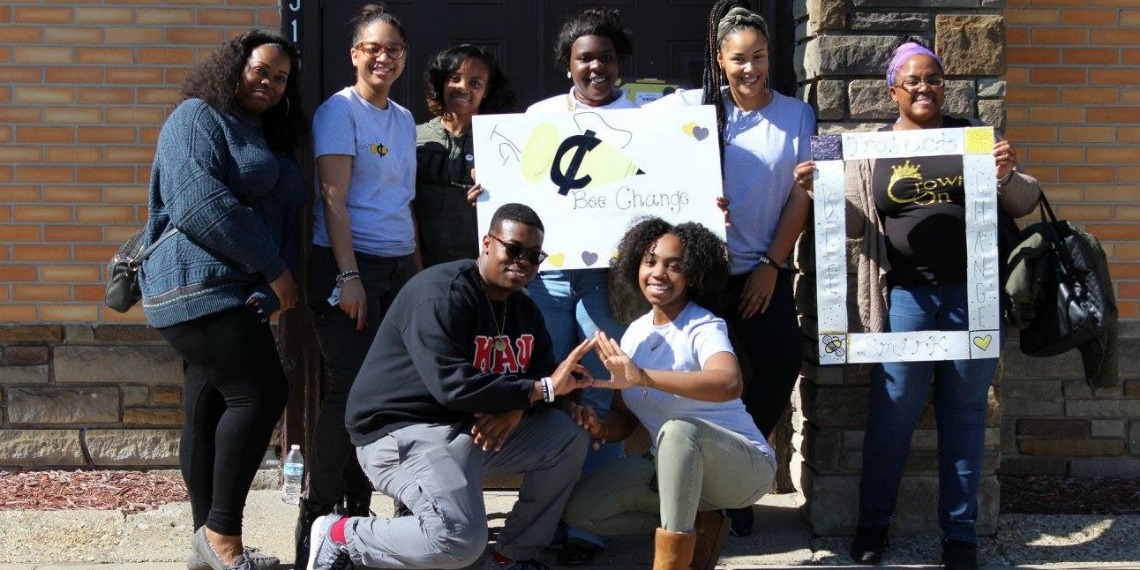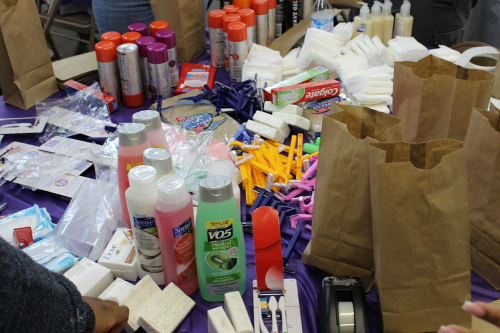
Wayne State University’s Black Student Union (BSU) teamed up with a variety of organizations Oct. 1 to provide clothes and toiletries to Detroit’s homeless community as part of a burgeoning relief effort.
Joined by Wayne State’s Organization of Black Alumni, Black Faculty and Staff Association and other community members, BSU volunteers offered hats, gloves, coats, deodorant, toothpaste, and additional items to more than 80 men and women throughout the city. The donation was part of the Homeless 100 project, a charitable initiative originally created by Project Smirk, an Atlanta-based nonprofit organization.
“It’s important to remember that we are all interconnected in some way and that there are so many things that many of us take for granted on a regular basis,” said WSU student and BSU Assistant Advisor Kimberly McDowell, who was one of the organizers of the relief project. “We realize that there are people who lack basic needs and who we could help to address those needs. There are so many people who go without every day. But why should they have to?”
The Black Student Union got involved in the Homeless 100 project in August, after McDowell learned about it from a friend who explained that organizers were looking to expand beyond Atlanta. Not long after hearing of the project, the BSU began calling for donations at Wayne State using word-of-mouth advertising and the social media app GroupMe. On-campus donations were slow early on as her group worked to promote the event, but it didn’t take long before items began to roll in.
 “A lot of individuals donated soap, toothbrushes and razors,” noted McDowell, an aspiring social worker. “We also asked for a lot of winter wear to ensure that those without shelter are kept a little warmer this winter.”
“A lot of individuals donated soap, toothbrushes and razors,” noted McDowell, an aspiring social worker. “We also asked for a lot of winter wear to ensure that those without shelter are kept a little warmer this winter.”
Once donations were dropped off on campus, McDowell met other volunteers at First Tabernacle Detroit to assemble care packages. After bundling together a range of items including tubes of toothpaste and packets of soap, the volunteers visited various locations around the city — from underpasses to shelters — to distribute the care packages. Much of the clothing that was donated was given away at the NSO Homeless Recovery Shelter, the volunteers’ final stop.
“When we got to NSO, we put the clothing on display, provided shopping bags and allowed people to gather what they needed,” recounted McDowell. “Anything extra that we had, we gave away there.”
McDowell said that this experience offered a stark reminder of the seriousness of homelessness in Detroit.
“A lot of individuals are lacking the resources they need as far as shelter and necessities,” she said. “Shelters that were once known places of refuge are in the process of moving or have had funding cuts. There are individuals who were once addicted to drugs but never got assistance because their addiction was seen as a crime instead of as part of an epidemic. And the impact of gentrification on the homeless population is inhumane to the degree that, by moving shelter locations, it adds to further marginalizing individuals who are already displaced.”
In addition to this donation, McDowell said that the BSU is working with another organization to prepare soup kitchen packets for impoverished and homeless Detroiters, adding that involvement in such efforts allows the BSU to uphold its motto of “cultivating leaders through leadership.”
“We intend to be informed leaders when it comes to aiding our community,” McDowell said. “Being part of the Homeless 100 project means that we’re acknowledging the problem, gathering people to participate and enlisting the help of others in our community.”
